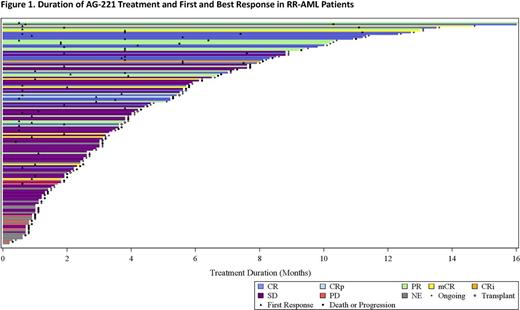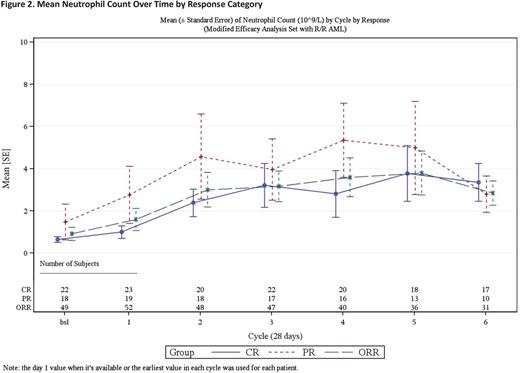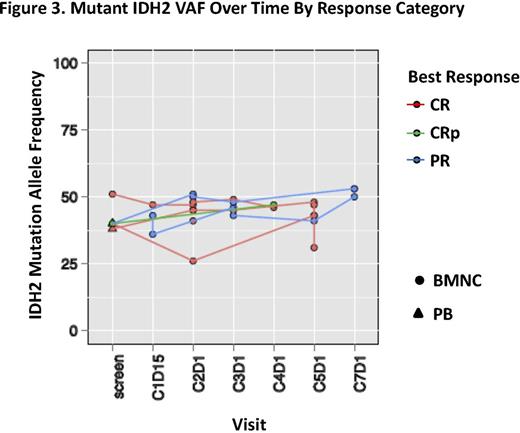Abstract
Background: There is an unmet need fortreatments (Tx) for myeloid malignancies, particularly relapsed/refractory (RR) AML, that provide durable remissions without worsening existing cytopenias that place patients (pts) at risk for serious infections or bleeding. Oral AG-221 is a selective, potent inhibitor of the mutant isocitrate dehydrogenase 2 (mIDH2) enzyme associated with hematologic malignancies. A phase 1/2 dose-escalation and expansion study of AG-221 [NCT01915498] is ongoing in pts with advanced hematologic malignancies. Reported here are AG-221 safety and efficacy results with a focus on pts with RR-AML, and the first AG-221 data to show changes in absolute neutrophil count (ANC) in early Tx and associated adverse events (AEs), response by mIDH2 type (R140Q or R172K), and mIDH2 variant allele frequency (VAF) on Tx over time.
Objectives: Assess AG-221 safety and efficacy in pts with advanced myeloid malignancies; and in responding RR-AML pts, evaluate response by mIDH2 mutation type, associations between ANC improvement and AEs, and mIDH2 VAF over time.
Methods: Pts ≥18 years with mIDH2-positive myeloid malignancies are eligible. AG-221 is administered QD or BID in continuous 28-day cycles. Dosing began at 50 mg QD or 30 mg BID and increased in subsequent cohorts. Response is measured from peripheral blood (PB) and bone marrow (BM) samples on days 15, 29, 57, and every 56 days thereafter, and by objective investigator report. Evaluable pts had a response assessment at Cycle 2 Day 1 or later, or discontinued before assessment. Stable disease (SD) is failure to achieve at least partial remission (PR) but no progressive disease (PD). ANC improvement in this analysis is defined as ≥1.0x109/L increase from baseline (BL). Next-generation sequencing was used to assess mIDH2 VAF longitudinally in a subset of responders, using the FoundationOne Heme test on purified mononuclear cells from BM or PB.
Results: At data cut-off (1 July 2015), 198 pts had received AG-221 and 83 (42%) remained on Tx. Median age was 69 yrs (19-100). 70% of pts had an R140Q and 25% had an R172K mutation (5% unknown). Most pts had RR-AML (n=138, 70% [untreated AML 17%, MDS 7%, other 6%]). Among RR-AML pts, 88 (64%) had received ≥2 prior Tx regimens (2 n=46, 3 n=24, ≥4 n=18), including intensive therapy, HMAs, or BM transplant. Median Tx durations overall and for RR-AML pts were 4.5 (95%CI 3.6-5.9) and 5.2 (3.6-6.1) months (mos), respectively. The highest daily AG-221 dose was 450 mg; maximum tolerated dose has not been reached. The most common Tx-related AEs were indirect hyperbilirubinemia (19%) and nausea (18%). Serious AEs (SAEs) were mainly disease-related; 35 pts (18%) had Tx-related SAEs, notably, leukocytosis (n=7). In all, 181 pts (91%), including 128 RR-AML pts, were efficacy evaluable. Objective responses were seen in 74 pts (41%), including 52 RR-AML pts (41%) (Table). Median response durations overall and in RR-AML pts were 6.9 (95%CI 3.7-9.2) and 6.0 (3.7-9.2) mos, respectively. Response rates were consistent in RR-AML pts, regardless of number of prior Tx regimens or mIDH2 type (R140Q 36%, R172K 39%). Eight pts went to transplant, including 5 RR-AML pts (Fig 1). Improvement from BL ANC (median 0.4 x109/L [0-15.5]) occurred in 72 RR-AML pts (56%), including 43 responders, and 23pts (40%) with SD. Among RR-AML responders, ANC increases occurred in cycle 1 (median 0.6 mos; 0.1-9.3), were durable through cycle 6 (Fig 2), and were associated with lower rates of infections and febrile neutropenia at cycles 1, 3, and 6 vs pts without ANC improvement. mIDH2 VAF did not decrease on-Tx in RR-AML pts who achieved a CR, CRp, or PR (Fig 3).
Conclusions: AG-221 was well-tolerated and induced responses in pts with advanced myeloid malignancies, including heavily pretreated RR-AML. Response rates in RR-AML were consistent regardless of number of prior Tx regimens or mIDH2 type. mIDH2 VAF did not change from BL in responding pts; however, rapid ANC improvements suggest that despite the persisting mutant clone, differentiation into mature myeloid cells (eg, neutrophils) occurred. These data give insight into the putative mechanism of AG-221 as a differentiation agent associated with early ANC improvement and clinical benefits.
| . | All (N=181) . | RR-AML (N=128) . |
|---|---|---|
| . | n (%) . | |
| Overall Response (CR, PR, CRp, CRi, mCR) | 74 (41) | 52 (41) |
| CR | 30 (17) | 23 (18) |
| CRp | 3 (2) | 1 (1) |
| CRi | 1 (1) | 1 (1) |
| mCR | 15 (8) | 8 (6) |
| PR | 25 (14) | 19 (15) |
| SD | 81 (45) | 57 (45) |
| PD | 9 (5) | 7 (6) |
| Not evaluable | 17 (9) | 12 (9) |
| . | All (N=181) . | RR-AML (N=128) . |
|---|---|---|
| . | n (%) . | |
| Overall Response (CR, PR, CRp, CRi, mCR) | 74 (41) | 52 (41) |
| CR | 30 (17) | 23 (18) |
| CRp | 3 (2) | 1 (1) |
| CRi | 1 (1) | 1 (1) |
| mCR | 15 (8) | 8 (6) |
| PR | 25 (14) | 19 (15) |
| SD | 81 (45) | 57 (45) |
| PD | 9 (5) | 7 (6) |
| Not evaluable | 17 (9) | 12 (9) |
Stein:Seattle Genetics: Consultancy; Agios Pharmaceuticals: Consultancy. DiNardo:Novartis: Research Funding. Altman:BMS: Consultancy; Spectrum: Consultancy; Astellas: Consultancy; Seattle Genetics: Consultancy; Ariad: Consultancy; Novartis: Consultancy. DeAngelo:Incyte: Consultancy; Pfizer: Consultancy; Bristol Myers Squibb: Consultancy; Agios: Consultancy; Amgen: Consultancy; Novartis: Consultancy; Ariad: Consultancy; Celgene: Consultancy. Kantarjian:ARAID: Research Funding; Amgen: Research Funding; Pfizer: Research Funding; BMS: Research Funding; Novartis: Research Funding. Sekeres:Celgene Corporation: Membership on an entity's Board of Directors or advisory committees. Fathi:Agios Pharmaceuticals: Other: Advisory Board participation; Seattle Genetics: Other: Advisory Board participation, Research Funding; Merck: Other: Advisory Board participation. Flinn:Celgene Corporation: Research Funding. Frankel:Stemline: Consultancy, Patents & Royalties, Research Funding. Levine:Loxo Oncology: Membership on an entity's Board of Directors or advisory committees; CTI BioPharma: Membership on an entity's Board of Directors or advisory committees; Foundation Medicine: Consultancy. Medeiros:Agios Pharmaceuticals: Honoraria; Celgene: Honoraria, Research Funding. Pollyea:Ariad: Consultancy; Pfizer: Consultancy; Celgene: Consultancy, Membership on an entity's Board of Directors or advisory committees, Research Funding; Karyopharm: Consultancy; Agios: Consultancy, Membership on an entity's Board of Directors or advisory committees; GlycoMimetics: Other: Member of data safety monitoring board. Stone:Abbvie: Consultancy; Sunesis: Consultancy, Other: DSMB for clinical trial; Celator: Consultancy; Celgene: Consultancy; Juno: Consultancy; AROG: Consultancy; Merck: Consultancy; Agios: Consultancy; Pfizer: Consultancy; Roche/Genetech: Consultancy; Amgen: Consultancy; Novartis: Research Funding; Karyopharm: Consultancy. Yen:Agios Pharmaceuticals: Employment, Equity Ownership. Attar:Agios Pharmaceuticals: Employment, Equity Ownership. Xu:Celgene Corporation: Employment, Equity Ownership. Tosolini:Celgene Corporation: Employment, Equity Ownership. Mei:Celgene Corporation: Employment, Equity Ownership. Thakurta:Celgene Corporation: Employment, Equity Ownership. Knight:Celgene Corporation: Employment, Equity Ownership. De Botton:Agios Pharmaceuticals: Research Funding.
Author notes
Asterisk with author names denotes non-ASH members.




This feature is available to Subscribers Only
Sign In or Create an Account Close Modal